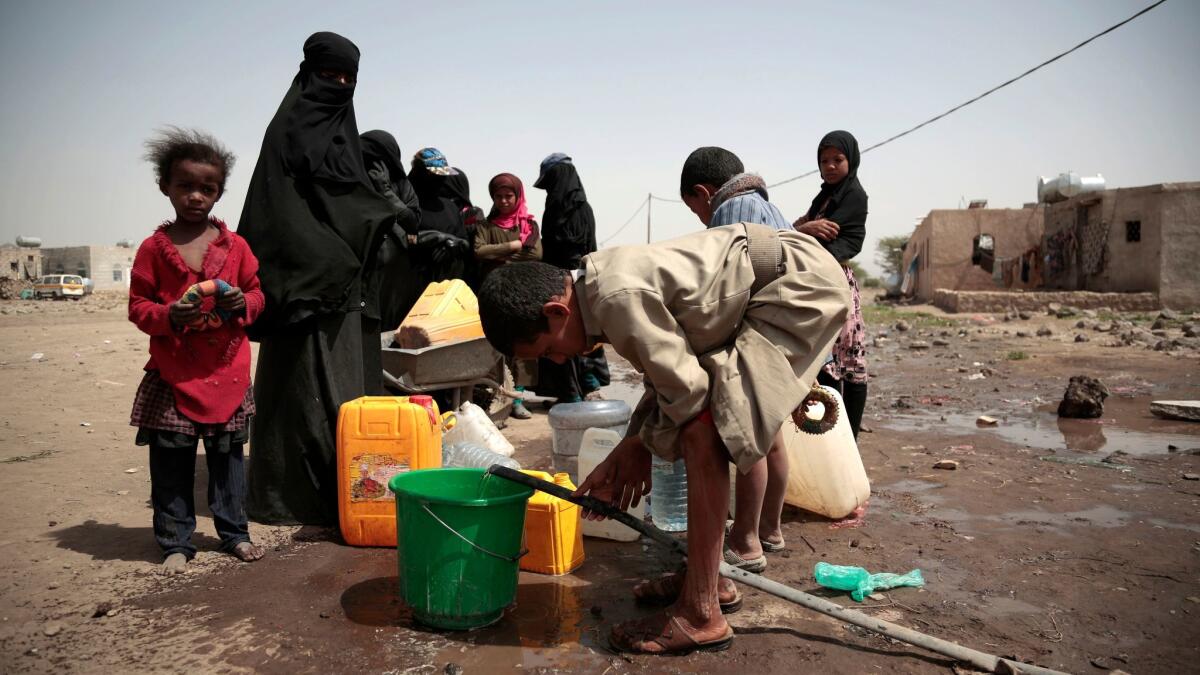Editorial: Yemen is on the brink of collapse and our allies the Saudis are to blame

- Share via
Saudi Arabia has been fighting a long and brutal war in Yemen against Houthi rebels, who ousted the Saudi-backed central government in 2014. More than 10,000 civilians have died in the conflict, and over 3 million have been displaced. Millions face starvation. The Saudis have been accused of violating the rules of war and taking insufficient steps to protect civilians, who have been killed in mosques and at funerals and on the streets. Now, thanks to the destruction of local water and sewage infrastructure, the world’s largest cholera epidemic has infected 300,000 people and is continuing to spread at a rate of 5,000 new cases a day.
Despite all this, the Trump administration has promised that the U.S. will provide Saudi Arabia with $110 billion in weapons, leading human rights groups and others to call the U.S. morally complicit — and possibly legally complicit — in the loss of civilian life.
In response to the backlash from human rights organizations around the world and to help make the arms deal more politically palatable, the Saudis have put forward two face-saving measures in recent weeks: The country’s crown prince promised to provide $67 million to the United Nations for cholera treatment. And the Saudis have agreed to engage in a $750-million multiyear program to train its air force on how to avoid civilian casualties. Both steps are better than nothing, but much more will be necessary.
In the long run, the conflict in Yemen requires a negotiated political solution, not a continuation of the failed Saudi military strategy which has not achieved its objectives. In the shorter run, there are steps that could help reduce the violence and alleviate the suffering.
For starters, both the Saudis and the Houthis need to stop treating food aid and medical assistance like bargaining chips, and must open ports and airports so that they can pass safely into the neediest and most conflict-ridden areas. The UN cannot deliver cholera vaccines without these access points, no matter how much money the Saudis throw at the problem. If the Saudis refuse to allow aid in, then Congress, which has grown increasingly impatient that country’s flagrant disregard for human rights, must consider what steps it can take to punish the House of Saud for such a heartless stance.
On Friday morning, the House of Representatives passed several amendments to the National Defense Authorization Act that call for greater congressional oversight on how U.S. weapons are being used in Yemen. One amendment, introduced by Rep. Ted Lieu (D-Torrance), requires the departments of State and Defense to report to Congress every six months on whether the Saudis are indeed bombing fewer civilians, as they have committed to This is an important step toward ensuring that our partner in the Middle East understands exactly where we stand: $110 billion in weapons is not a blank check.
More to Read
A cure for the common opinion
Get thought-provoking perspectives with our weekly newsletter.
You may occasionally receive promotional content from the Los Angeles Times.






